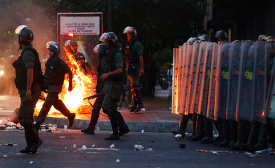nicolas maduro
The color red sets off alarm bells these days in this western Venezuelan city, where anti-government protests sparked nationwide demonstrations that have endured since early February. Save for the red stripe on the Venezuelan flag, which also has yellow and blue, here anything of that color looks suspiciously allusive to the late president Hugo Chávez, who popularized red among his supporters as the official color of his self-styled “Bolivarian” revolution.
If Brazil is not for beginners, as the saying goes, then Venezuela isn't, either. But as far as the two countries' recent protest experiences go, they have a few interesting elements in common. At first glance, the countries seem quite different: Venezuela is deeply and bitterly politically polarized, with shortages of basic food staples and goods, rising inflation, spiraling crime rates, and what some say is a breakdown of institutions.
As much of the world’s media continues to focus on the politics of the 2014 Sochi Winter Olympics and the continued violent protests in the Ukraine, another country closer to home threatens to descend into civil war. Street demonstrations throughout Venezuela, now entering their second week, have turned a country already suffering from high rates of violent crime and murders into a battleground.

As much of the world’s media continues to focus on the politics of the 2014 Sochi Winter Olympics and the continued violent protests in the Ukraine, another country closer to home threatens to descend into civil war.
The massive protests sweeping Venezuela come at a time when many in that country have an increasingly dark view of both their own standard of living and the direction of the nation’s economy. A record low 33% of Venezuelans said their standard of living was improving, according to a Gallup poll conducted last fall and released Tuesday. Just a year earlier, 54% had said their standard of living was improving.
The US State Department has expelled three Venezuelan diplomats in response to last week's expulsion of three consular officials from Caracas. Jen Psaki, the department's spokeswoman, said on Tuesday that First Secretary Ignacio Luis Cajal Avalos, First Secretary Victor Manuel Pisani Azpurua, and Second Secretary Marcos Jose Garcia Figueredo, have 48 hours to leave the US.
Tens of thousands of white-clad demonstrators flooded the streets of eastern Caracas yesterday in the largest show of strength so far against President Nicholás Maduro’s rule. The arrest of opposition firebrand Leopoldo López for fomenting unrest – and the heavy-handed tactics of security forces – hasn’t snapped the momentum of the demonstrations. Instead, Venezuela's fractured opposition banded together to denounce the jailing of Mr. López and the government’s broader crackdown on dissent.
Late President Hugo Chavez used to call it “la revolucion bonita” (the pretty revolution), but the world looked at Venezuela last week and saw only ugliness. Protesters gunned down in the streets, barricades in flames, chaos. One of the dead was a 22-year-old beauty queen shot in the head. With the government censoring and cowing TV reports, many of the images came from smartphones, grainy and jerky snippets filled with smoke and shouts.







